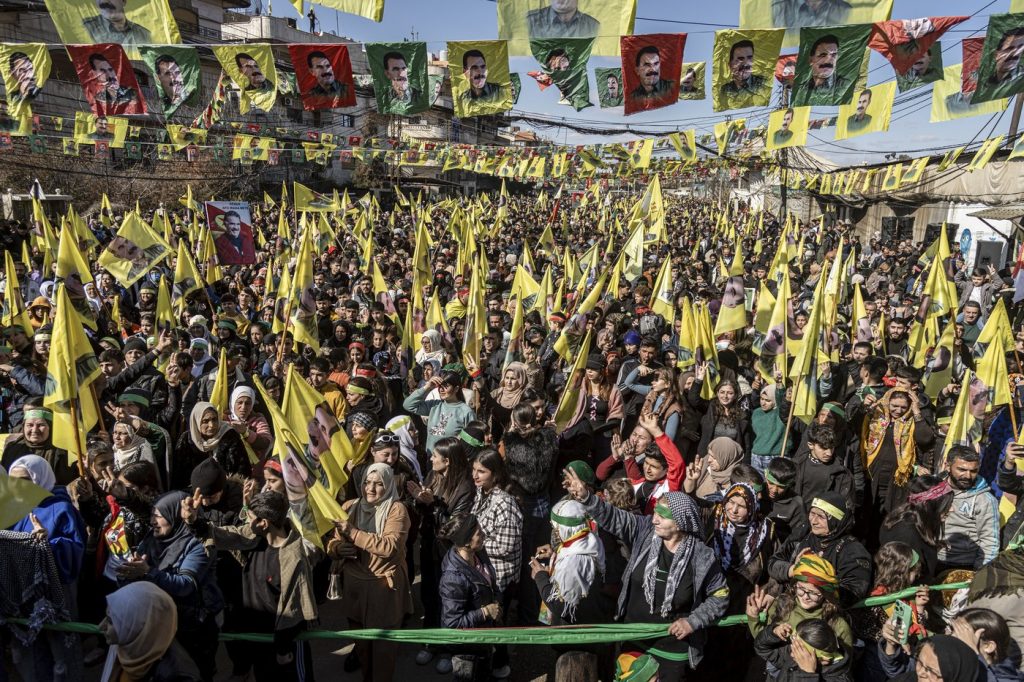BAGHDAD (AP) - A delegation from the Turkish opposition party, the People’s Equality and Democracy Party (DEM), arrived in Iraq's semiautonomous Kurdish region on Sunday amid ongoing peace efforts between Ankara and the banned Kurdish separatist group, the Kurdistan Workers' Party (PKK), in Turkey. Led by senior officials Sirri Sureyya Onder and Pervin Buldan, the delegation met with Masoud Barzani, head of the Kurdistan Democratic Party, the dominant Kurdish political entity in Iraq, in Irbil.
During their meeting, Barzani's office reported that discussions centered around the peace process in Turkey. The Turkish delegation conveyed a message from Abdullah Ocalan, the imprisoned leader of the PKK. Barzani emphasized the necessity for all parties involved to intensify their efforts to ensure that the peace process yields favorable outcomes, expressing his readiness to assist in making the peace initiative a success.
The DEM party has long advocated for enhanced democracy within Turkey and has campaigned for improved rights for the Kurdish population, alongside challenging conditions for Ocalan, who has been in prison since his capture in 1999. Ocalan, who founded the PKK in 1978, has been serving a life sentence on Imrali Island since being convicted of treason. The conflict initiated by the PKK in 1984 for an autonomous Kurdish state in southeastern Turkey has led to tens of thousands of deaths. The Iraqi central government imposed a ban on the PKK last year, which maintains bases in northern Iraq and is designated as a terrorist organization by Turkey and its Western allies.
The historical relationship between the Turkish government, led by President Recep Tayyip Erdogan, and the DEM party has been fraught with tension, characterized by the frequent ousting of DEM officials on charges of PKK affiliations. However, a thaw in relations was noted after Erdogan's coalition partner, Devlet Bahceli, hinted last October at the possibility of granting Ocalan parole, contingent on the disbanding of his group and a renunciation of violence.
This peace initiative comes at a critical juncture for Erdogan, as he requires the support of the DEM party in parliament to facilitate a new constitutional framework that could permit him to extend his tenure beyond current limits. Under the Turkish Constitution, Erdogan, who has been in power since 2003 first as Prime Minister and subsequently as President, cannot seek another term unless an early election is called, necessitating action from the pro-Kurdish bloc.
Simultaneously, Erdogan's administration has intensified a crackdown on opposition, resulting in the arrests of journalists and politicians. Recently, several elected Kurdish mayors have been ousted and replaced by state-appointed officials, with the mayor of Van being the most recent casualty of this policy.
In a related context, conflicts persist between Turkish-backed armed groups and Kurdish forces in northeastern Syria. Turkey perceives the Syrian Democratic Forces (SDF), a U.S.-backed Kurdish military coalition in Syria, as an extension of the PKK. The SDF has been engaged in negotiations with the new Syrian government in the wake of the removal of former President Bashar Assad. Unlike other former insurgent factions that have chosen to dissolve and integrate into a new Syrian army, the SDF has thus far resisted such moves.
On Saturday, Turkish Foreign Minister Hakan Fidan stated that the Turkish government would reevaluate its military involvement in northeastern Syria if the new Syrian leadership were to eliminate the PKK's presence in the region. Concurrently, Kurds in northeastern Syria organized mass protests demanding Ocalan's release, highlighting the ongoing tensions and aspirations within the Kurdish community related to their leadership and rights.










